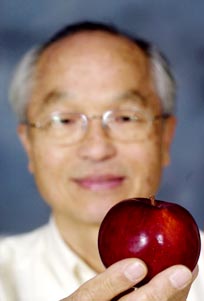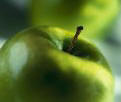An apple a day could help protect against brain-cell
damage, CU studies find
 |
| Chang Y. "Cy" Lee,
professor of food science at Cornell's New York State Agricultural
Experiment Station in Geneva, shows off a typical apple, which he found
contains a group of chemicals that can shield the brain from cellular
damage. Photo provided by Joe
Ogrodnick |
By Susan S. Lang
A group of
chemicals in apples could protect the brain
from the type of damage that triggers such neurodegenerative diseases as
Alzheimer's and Parkinsonism, according to two new studies from Cornell food
scientists.
The studies show that the chemical
quercetin, a so-called
phytonutrient, appears to be largely responsible for protecting rat brain
cells when assaulted by oxidative stress in laboratory tests.
Phytonutrients, such as
phenolic acids and flavanoids,
protect the apple against bacteria, viruses and fungi and provide the
fruit's antioxidant and anti-cancer benefits. Quercetin is a major flavanoid
in apples. Antioxidants help prevent cancer by mopping up cell-damaging free
radicals and inhibiting the production of reactive substances that could
damage normal cells.
"The studies show that additional
apple consumption not
only may help reduce the risk of cancer, as previous studies have shown, but
also that an apple a day may supply major
bioactive compounds, which may
play an important role in reducing the risk of neurodegenerative disorders,"
says Chang Y. "Cy" Lee, professor of food science at the university's New
York State Agricultural Experiment Station in Geneva.
In a study that recently appeared online and is published
in the November/December 2004 issue of the Journal of Food Science,
Lee and his co-authors compared how two groups of rat neuronal cells fared
against hydrogen peroxide, a common oxidative stressor. Only one of the two
groups was pretreated with different concentrations of
apple phenolic
extracts.
The researchers found that the higher the concentration of
apple phenolic extract, the greater the protection was for the nerve cells
against oxidative stress.
"What we found was that the
apple phenolics, which are
naturally occurring antioxidants found in fresh apples, can protect nerve
cells from neurotoxicity induced by oxidative stress," Lee said.
When Lee and co-author Ho Jin Heo, a visiting fellow at
Cornell, looked at quercetin, they found that it appeared to be the main
agent responsible for the beneficial effect. In fact, they found
quercetin
works even better in protecting nerve cells against hydrogen peroxide than
vitamin C, a naturally occurring antioxidant known to help prevent cell and
tissue damage from oxidation. Quercetin is primarily found in apples,
berries and onions.
This study, which appeared online recently, will be
published in an upcoming issue of the Journal of Agricultural and Food
Chemistry.
The two studies build on Lee's 2002 findings that
quercetin has stronger anti-cancer activity than vitamin C, and his 2000
findings that phytochemicals in apples have
stronger anti-oxidant protective
effects than vitamin C against colon and liver cancer cells.
Other studies have found that phytochemicals are
associated with a reduced risk of cancer, heart disease and diabetes, and
that they fight not only cancer but also bacterial and viral infections. In
addition, they are anti-allergenic and anti-inflammatory.
Although Lee stresses that his studies were conducted in
the laboratory, not in clinical trials with humans, he has no hesitation in
recommending more apples in the diet as well as other fresh fruits and
vegetables. "Indeed, I have a reason to say an apple a day keeps the doctor
away," he said.
The researchers used red delicious apples grown in New
York state to provide the extracts to study the effects of
phytochemicals.
Lee said that all apples are high in the critical phytonutrients and that
the amount of phenolic compounds in the apple flesh and in the skin vary
from year to year, season to season and from growing region to growing
region.
The study on
apple phenolics, which was co-authored by Heo
and D.O. Kim, a postdoctoral researcher at Cornell, as well as S.J. Choi and
D.H. Shin at Korea University, was supported in part by Heo's postdoctoral
fellowship through the Korea Science and Engineering Foundation (KSEF) and
the U.S. Department of Agriculture. The study on quercetin, authored by Lee
and Heo, also was supported, in part, by the KSEF fellowship program and
U.S. Apple Association.
December 2, 2004
(more news)
|
